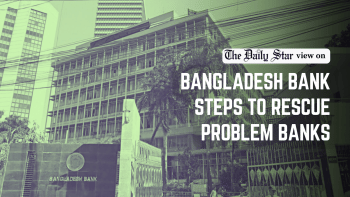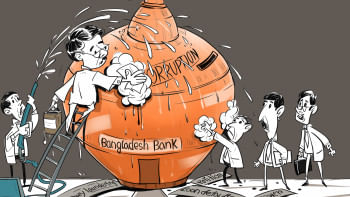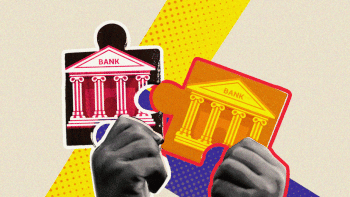Why is the banking sector crisis so deep-rooted?

The crisis that Bangladesh's banking sector is facing now is not simply a bundle of problems exclusive to banking, monetary, financial, accounting or managerial aspects. The sector is a victim of political extortion and rent-seeking cultures. The irregularities of the other five institutions of the past regime are mainly attributable to what the banking sector faces now. These institutions include: i) the finance ministry; ii) capital market; iii) parliament and bank-related lawmakers; iv) top-level bank borrowers and bank directors; and finally v) the financial judiciary.
The moral hazards such as taking big-ticket loans and not paying them back were not confined to the banking sector alone. This culture of extracting people's money has been an integral component of big companies, ardently endorsed by corrupt politicians in power. Thus, the crisis in the banking sector is deep-rooted. The amount of defaulted loans as a share of total outstanding loans reached 12.56 percent in June 2024 from 8.96 percent in June 2022. At the end of September, the amount of defaulted loans escalated to almost Tk 2.85 lakh crore, which is 16.93 percent of the total outstanding loans. In December 2023, the International Monetary Fund (IMF) estimated the non-performing loan (NPL) share to be 25 percent of outstanding loans.
The turbulent July-September quarter saw an unprecedented increase of nearly Tk 74,000 crore in defaulted loans, vindicating that the sector is really in a crisis no matter if the government downplays it or not. The crisis was man-made since the default culture was largely wilful, indulged by the past regime for the monetary benefits of the corrupted politicians and laundering tycoons who received blanket endorsement for all their wrongdoings.
The share of defaulted loans rose from nine percent to 13 percent within the last two years when GDP growth was around six percent on average, suggesting that the default culture was largely wilful. Alarmingly, the default ratio that was shown in data is the tip of the iceberg, because the definition of default was perversely loosened by the past finance minister in 2019-2024 and the two central bank governors during the same period to revitalise the energy of the bank looters. That made the crisis worse.
The defaulters were allowed to adjust even as low as five percent of the defaulted loans to get rid of the "stigma" of default. The past Awami League regime allowed multiple loose definitions to let some notorious tycoons participate in the national election and make faulty laws in their favour. There is another way to see that the default culture was wilful and evidently not a macroeconomy-wide issue. The high variation in the NPL ratios based on various ownerships unveils the story of how the state-owned banks were subject to a higher degree of looting, while private or foreign banks were able to maintain much lower NPL ratios.
A Bangladesh Bank report shows that at the end of June 2021, the NPL ratios were 3.9 percent and 5.4 percent in foreign banks and private banks, respectively, while the number was as high as 20.6 percent in state-owned banks. The numbers are much higher than what we see here since these ratios were calculated under the loose definitions of default. One thing is clear: the looting was religiously state-sponsored and passionately orchestrated by the politicians in power. And that's why the crisis is hard to reverse.
Corrupt politicians indulged three groups of culprits—tax dodgers, loan defaulters, and money launderers—who formed the devil's triangle of cronyism, and often belonged to the same group of looters deeply connected with the previous regime. If you can show loss in your income statements by the wicked art of accounting, you can be excused as loan defaulters and you can avoid paying taxes. However, you don't want to keep the fund inside the country, and that's why both tax dodgers and loan defaulters turn out to be money launderers at the same time.
The current Bangladesh Bank governor, Dr Ahsan H Mansur, said last month that $17 billion have been laundered out of the country over the 15-plus years of Awami League regime; only one Chattogram family is alleged to have laundered $10 billion alone. He also said Tk 4 lakh crore is now the de facto defaulted loans that form 25 percent of the total advances. And Tk 2 lakh crore has gone to only a handful of families. This group of mafias plundered Bangladesh's banking sector to dump it into an incurable crisis. Much to people's frustration, some of them became members of parliament and even ministers, while some were made ministerial-level advisers to the former prime minister. The parliament turned into a haven of financial hooligans. The crisis will never end if people see the return of the same political practice of cultivating the tycoons' support in exchange for letting them plunder the banking sector.
More family-based banks were allowed to mushroom in the name of enhancing competition, while a Chattogram-based family was encouraged to eclipse as high as seven banks single-handedly under the service of the intelligence agencies whenever needed. Any allegation or court case against that family was made "unwarranted" by influencing the judiciary. Most default cases fell in the quagmire of judicial tardiness for years, worsening the fate of loan recovery.
Thus, the regime-sponsored immorality to protect or pamper the financial gangsters not only eroded the future of the banking sector, but also made the wound too difficult to recover. Since the crisis in the banking industry is not simply its intrinsic problem, we need to correct those five institutions or related laws before we can expect a healthy recovery of the sector. Reforms must address these areas before energising the sector to move ahead swimmingly.
The writing draws heavily from the keynote speech at the BDI International Conference on Bangladesh held at the University of California, Berkeley on November 8-9, 2024.
Dr Birupaksha Paul is professor of economics at the State University of New York at Cortland in the US.
Views expressed in this article are the author's own.
Follow The Daily Star Opinion on Facebook for the latest opinions, commentaries and analyses by experts and professionals. To contribute your article or letter to The Daily Star Opinion, see our guidelines for submission.

 For all latest news, follow The Daily Star's Google News channel.
For all latest news, follow The Daily Star's Google News channel. 










Comments